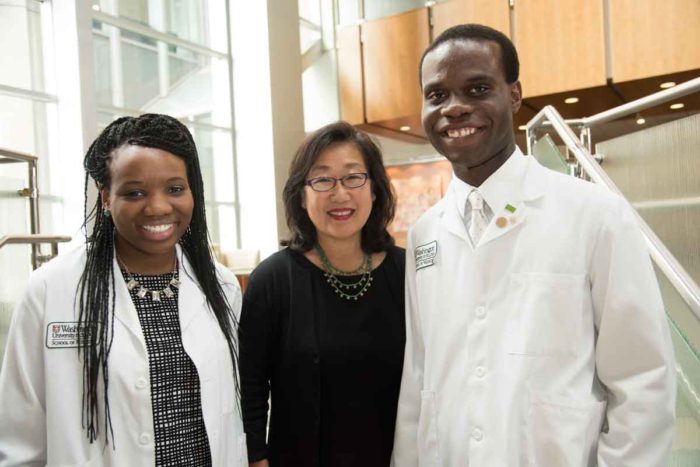Two medical students named Howard Hughes fellows
Distinguished award offers a year of mentored research
 Robert Boston
Robert BostonWashington University medical students Rukayat Taiwo (left) and Kow Essuman (right) have been selected to receive mentored training with top biomedical scientists through the Howard Hughes Medical Institute’s (HHMI) Medical Research Fellows Program. They are shown with Koong-Nah Chung, PhD, the university’s associate dean for medical student research and director of the Office of Medical Student Research.
Two medical students at Washington University School of Medicine in St. Louis have been selected to receive mentored training with top biomedical scientists through the Howard Hughes Medical Institute’s (HHMI) Medical Research Fellows Program.
The $3 million annual initiative gives aspiring physicians and scientists $41,000 each in grant support, allowing students to spend a year conducting basic, transitional or applied biomedical research in a laboratory.
The School of Medicine’s recipients are Rukayat Taiwo and Kow Essuman. Taiwo is one of 66 students awarded the fellowship for the first time, while Essuman is one of 13 fellows to receive funding for a second year.
“The goal of the HHMI medical student fellowship program is to train the next generation of physician-scientists,” said Koong-Nah Chung, PhD, the university’s associate dean for medical student research and director of the Office of Medical Student Research. “Performing cutting-edge research that emphasizes the connections between patient care and scientific research can give students a completely new perspective and career path.”
Each submitted a proposal and named a mentor when applying.
A third-year student at the School of Medicine, Taiwo’s research focuses on the brain cancer glioblastoma. “I am passionate about this topic,” Taiwo said. “Specifically, I will study a subpopulation of cancer cells that have the capacity to divide continually and are responsible for therapy resistance and tumor recurrence of this cancer, which is often deadly.”
Her mentor is Albert H. Kim, MD, PhD, an assistant professor of neurological surgery, of neurology and of development biology.
“The HHMI fellowship also provides opportunities for me to interact with and learn from other HHMI fellows as well as prominent scientists. The networks I will join extend beyond this fellowship and into my career as a physician,” Taiwo said.
Essuman’s research focuses on axon degeneration. His goal is to identify new treatments for neurodegenerative diseases. His mentor is Jeffrey D. Milbrandt, MD, PhD, the James S. McDonnell Professor and head of the Department of Genetics.
“I’m grateful for a second year to extend the exciting results I have obtained in the past year,” said Essuman, a third-year medical student. “The fellowship experience also provides multiple opportunities to network with renowned scientists at meetings.”
Altogether, the HHMI fellows come from 34 schools nationwide.
“This engagement is perhaps the best way for talented students at this stage in their training to understand the powerful opportunity that emerges at the intersection of medicine and laboratory research,” said David J. Asai, the institute’s senior director of science education.
The HHMI program has funded more than 1,700 students since it began in 1989.






